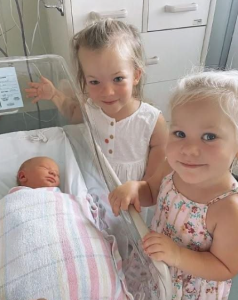A Couple with Dwarfism Gave Birth to Three Children Against Doctors’ Warnings — And Proved That Happiness Doesn’t Depend on Height
When Emily and Marcus Hayes first dreamed of starting a family, they were met not with congratulations, but with caution. Both born with a form of dwarfism known as achondroplasia, Emily (4’1”) and Marcus (4’3”) had spent their lives overcoming barriers. But nothing prepared them for the wave of resistance they faced when they told doctors they wanted children.
Medical professionals warned them of complications. Friends and family expressed worry. Even genetic counselors sat them down and, with clinical coldness, ran through statistics: high risk of skeletal problems, respiratory issues, and the chance—if both parents passed on the same dwarfism gene—that the child wouldn’t survive.
But for Emily and Marcus, their journey had never been defined by fear—it was defined by hope. And through patience, love, and resilience, they proved something much bigger than any diagnosis: that joy doesn’t measure itself in inches.
A Love That Grew Beyond Limits
Emily and Marcus met at a conference for people with skeletal dysplasia in San Diego over a decade ago. She was a vibrant preschool teacher from Oregon; he was a web developer from Atlanta who moonlighted as a motivational speaker. A shared sense of humor and perspective on life quickly bonded them.
“He made me laugh like no one ever had,” Emily recalls. “And he never once looked at my height like it was a limitation.”
Within two years, they were married. Their wedding photos—Emily in a lacy ivory gown, Marcus in a custom-tailored navy suit—went viral online for all the right reasons. But behind the joy was a tough decision they’d already begun to face: whether or not to have children.
The Medical Warning
Doctors were blunt. The odds weren’t in their favor.
Children born to two parents with achondroplasia have a 25% chance of inheriting two copies of the gene, which often results in a fatal condition known as homozygous achondroplasia. There was also a 50% chance of the child having achondroplasia (like the parents), and a 25% chance of being average height.
Emily remembers the words of one geneticist: “It’s not advised. You could be putting your child through a life of hardship.”
That sentence lingered with them—but not in the way the doctor expected. “We had both lived lives people thought weren’t worth living,” Marcus said. “And yet, we were happy, educated, loved. So who’s to say what’s worth it?”
Firstborn: A New Kind of Normal
Despite the risks, they decided to try—and after months of anxious anticipation, Emily became pregnant. Every checkup brought tension. Every ultrasound was met with both joy and dread. When their son, Noah, was born—crying, kicking, and measuring a healthy weight—they both wept.
Noah was diagnosed with achondroplasia like his parents, but he was otherwise healthy. “He was perfect,” Emily said. “The second I held him, I knew: this was the right choice.”
Raising a child as a little person couple brought its own unique challenges. Cribs had to be custom-built. Car seats had to be modified. Grocery trips meant constant stares.
But they met each hurdle with creativity and confidence. “We just parented in our own way,” Marcus said. “We didn’t try to fit into the world’s mold. We made our own.”
Growing the Family — And Facing More Doubts
Two years later, they welcomed their second child, a daughter named Lily. Unlike her brother, Lily was born average height. The adjustment was physical—she outgrew her parents faster than expected—but emotionally, it was seamless.
“Love isn’t limited by genetics or growth charts,” Emily said. “We loved her just as fiercely, just as deeply.”
Still, critics remained. Online trolls accused them of being selfish. Some even called their decision “irresponsible.” But the Hayes family didn’t respond with anger—they responded with photos of bedtime snuggles, backyard birthday parties, and Halloween costumes crafted together by hand.
When their third child, Max, was born with achondroplasia like Noah, the family was complete.
“We had three very different kids,” Marcus said. “One average height, two little. All loved, all thriving.”
More Than Their Size: Redefining Family Values
Today, the Hayes family is a symbol of inclusion and strength. Their story has been featured in parenting blogs, disability rights forums, and even on national television. But they insist they’re not trying to be inspirational—they’re just being real.
“I don’t want people to see us and say, ‘Wow, look what they accomplished despite their condition,’” Emily said. “I want them to say, ‘Look at this joyful family. Look how normal love and laughter can look in any form.’”
Their home is full of color and sound. Marcus often sits on a custom-built bench with his laptop while Lily paints next to him. Emily reads to Max and Noah using a stepstool and a lap blanket. The kids don’t focus on their parents’ height—they focus on their warmth.
“They’re our heroes,” Noah once said during a class presentation. “They just happen to be shorter than other moms and dads.”
What They’ve Taught the World
In a world that often tries to measure worth by appearances, the Hayes family stands tall in other ways. They’ve shown that love isn’t limited by genetics or stature. That parenting isn’t about being the biggest—it’s about showing up, standing strong, and lifting others even when you can’t physically reach the top shelf.
They’ve also become quiet advocates for people with disabilities—not by preaching, but by existing openly and proudly. Emily has written blog posts about parenting while little. Marcus has spoken at schools about kindness, difference, and dignity.
Their children are growing up with empathy, adaptability, and pride in their family.
“We don’t want sympathy,” Marcus says. “We want understanding. We want people to see that our lives are full—not despite who we are, but because of who we are.”
A Joy That Can’t Be Measured
Against medical warnings, public doubt, and the realities of raising children in a world not built for them, Emily and Marcus Hayes built a family anyway. A beautiful, unique, joyful family.
And every time they tuck their kids in at night, climb up a tiny stool to kiss them goodnight, and laugh about how Max still thinks broccoli is poison—they’re reminded that happiness has nothing to do with height.

